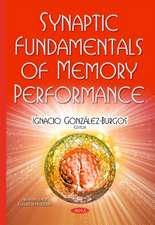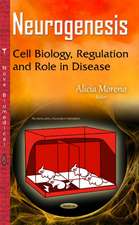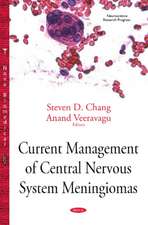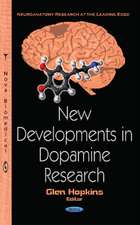Muscarinic Receptor: From Structure to Animal Models: Neuromethods, cartea 211
Editat de Jaromir Myslivecek, Jan Jakubiken Limba Engleză Hardback – 13 iul 2024
Cutting-edge and authoritative, Muscarinic Receptors – From Structure to Animal Models, Second Edition is a valuable resource for scientists who are interested in using the latest methodologies to study muscarinic receptors quickly, easily, and correctly.
| Toate formatele și edițiile | Preț | Express |
|---|---|---|
| Paperback (1) | 581.50 lei 38-44 zile | |
| Springer – noi 2016 | 581.50 lei 38-44 zile | |
| Hardback (2) | 584.12 lei 38-44 zile | |
| Springer – 5 aug 2015 | 584.12 lei 38-44 zile | |
| Springer Us – 13 iul 2024 | 1399.45 lei 6-8 săpt. |
Din seria Neuromethods
- 5%
 Preț: 347.57 lei
Preț: 347.57 lei - 15%
 Preț: 659.53 lei
Preț: 659.53 lei - 15%
 Preț: 665.08 lei
Preț: 665.08 lei - 18%
 Preț: 986.63 lei
Preț: 986.63 lei - 24%
 Preț: 852.89 lei
Preț: 852.89 lei - 18%
 Preț: 953.03 lei
Preț: 953.03 lei - 18%
 Preț: 955.25 lei
Preț: 955.25 lei - 20%
 Preț: 1129.36 lei
Preț: 1129.36 lei - 20%
 Preț: 1252.04 lei
Preț: 1252.04 lei - 18%
 Preț: 1291.45 lei
Preț: 1291.45 lei - 15%
 Preț: 652.31 lei
Preț: 652.31 lei - 18%
 Preț: 955.70 lei
Preț: 955.70 lei - 23%
 Preț: 705.39 lei
Preț: 705.39 lei - 18%
 Preț: 973.38 lei
Preț: 973.38 lei - 18%
 Preț: 964.86 lei
Preț: 964.86 lei - 18%
 Preț: 968.03 lei
Preț: 968.03 lei - 15%
 Preț: 662.95 lei
Preț: 662.95 lei - 15%
 Preț: 646.43 lei
Preț: 646.43 lei - 15%
 Preț: 649.71 lei
Preț: 649.71 lei -
 Preț: 395.29 lei
Preț: 395.29 lei - 19%
 Preț: 580.67 lei
Preț: 580.67 lei - 19%
 Preț: 584.12 lei
Preț: 584.12 lei - 19%
 Preț: 566.41 lei
Preț: 566.41 lei - 15%
 Preț: 652.17 lei
Preț: 652.17 lei - 15%
 Preț: 655.13 lei
Preț: 655.13 lei - 18%
 Preț: 959.36 lei
Preț: 959.36 lei - 15%
 Preț: 652.49 lei
Preț: 652.49 lei - 15%
 Preț: 649.54 lei
Preț: 649.54 lei - 15%
 Preț: 649.87 lei
Preț: 649.87 lei - 15%
 Preț: 650.19 lei
Preț: 650.19 lei - 15%
 Preț: 648.42 lei
Preț: 648.42 lei - 18%
 Preț: 1039.22 lei
Preț: 1039.22 lei - 18%
 Preț: 963.15 lei
Preț: 963.15 lei
Preț: 1399.45 lei
Preț vechi: 1706.65 lei
-18% Nou
Puncte Express: 2099
Preț estimativ în valută:
267.79€ • 280.30$ • 222.88£
267.79€ • 280.30$ • 222.88£
Carte tipărită la comandă
Livrare economică 31 martie-14 aprilie
Preluare comenzi: 021 569.72.76
Specificații
ISBN-13: 9781071640142
ISBN-10: 1071640143
Pagini: 390
Ilustrații: XII, 358 p. 115 illus., 93 illus. in color.
Dimensiuni: 178 x 254 mm
Ediția:Second Edition 2024
Editura: Springer Us
Colecția Humana
Seria Neuromethods
Locul publicării:New York, NY, United States
ISBN-10: 1071640143
Pagini: 390
Ilustrații: XII, 358 p. 115 illus., 93 illus. in color.
Dimensiuni: 178 x 254 mm
Ediția:Second Edition 2024
Editura: Springer Us
Colecția Humana
Seria Neuromethods
Locul publicării:New York, NY, United States
Cuprins
Radioligand Binding at Muscarinic Receptors.- Tissue-Segment Binding Method for Detection of Muscarinic Acetylcholine Receptors in Receptor’s Natural Environment.- Use of Antibodies in the Research on Muscarinic Receptor Subtypes.- Allosteric Modulation of Ligand Binding to Muscarinic Receptors.- Allosteric Modulation of Functional Response of Muscarinic Receptors.- Exploring Muscarinic Acetylcholine Receptor Binding Kinetics with Fluorescence Anisotropy.- MultiBacMam Technology for Studying the Downstream cAMP Signaling Pathway of M2 Muscarinic Acetylcholine Receptor.- Subcellular and Synaptic Distribution of Muscarinic Receptors in Neurons by Confocal and Electron Microscopy.- Investigation of Muscarinic Receptors by Fluorescent Techniques.- Autoradiography Assessment of Muscarinic Receptors in the Central Nervous System with a Special Focus on the Selectivity for M1 and M2 Muscarinic Receptors: Specific Protocol for M1 Muscarinic Receptors Labelling.- Detection of Non-Neuronal Acetylcholine.- Utilization of Superfused Cerebral Slices in Probing muscarinic Receptor Autoregulation of Acetylcholine Release.- Evaluation of Acetylcholine Synthesis and Release in Striatal Cholinergic Interneurons.- Regulation of Heart Contractility by M2 and M3 Muscarinic Receptors: Functional Studies using Muscarinic Receptor Knockout Mouse.- Muscarinic Regulation of Gastrointestinal Motility.- Systems for a Long-Term Record of Animal Activity, Temperature, and Heart Rate Affected by Muscarinic Receptors.
Textul de pe ultima copertă
This second edition volume expands on the previous edition with updated protocols on basic techniques of radioligand binding, allosteric modulation, visualization and antibody use, and autoradiography and non-neuronal acetylcholine detection. The updated chapters also cover the latest fluorescent techniques including fluorescence anisotropy, and provide updates on current system measurements of heart contractility and gastrointestinal tract motility to provide readers with a comprehensive picture of current muscarinic receptors from molecular to systemic levels. In the Neuromethods series style, chapters include the kind of detail and key advice from the specialists needed to get successful results in your laboratory.
Cutting-edge and authoritative, Muscarinic Receptors – From Structure to Animal Models, Second Edition is a valuable resource for scientists who are interested in using the latest methodologies to study muscarinic receptors quickly, easily, and correctly.
Cutting-edge and authoritative, Muscarinic Receptors – From Structure to Animal Models, Second Edition is a valuable resource for scientists who are interested in using the latest methodologies to study muscarinic receptors quickly, easily, and correctly.
Caracteristici
Includes cutting-edge methods and protocols Provides step-by-step detail essential for reproducible results Contains key notes and implementation advice from the experts













